Cadogan Surname Ancestry ResultsOur indexes 1000-1999 include entries for the spelling 'cadogan'. In the period you have requested, we have the following 197 records (displaying 1 to 10): Single Surname Subscription | | | Buying all 197 results of this search individually would cost £1,018.00. But you can have free access to all 197 records for a year, to view, to save and print, for £100. Save £918.00. More... |
These sample scans are from the original record. You will get scans of the full pages or articles where the surname you searched for has been found. Your web browser may prevent the sample windows from opening; in this case please change your browser settings to allow pop-up windows from this site. Inhabitants of Cheshire and North Wales
(1320-1329)
The county of Cheshire had palatine status, being in some measure independent of the rest of England: moreover, from the Statute of Wales of 1284, after king Edward I's subjugation of North Wales, until the union of England and Wales in 1536 to 1543, much of the administration of North Wales (county Flint in particular) was directed from Chester. When the Chester Recognizance Rolls were moved from Chester to the Public Record Office, they were placed among the Welsh Records. These rolls, so called because they do include recognizances (of debts &c.) among their contents, are in fact the Chancery Rolls of the palatinate, containing enrolments of charters, letters patent, commissions and other documents issued under the seal of the palatinate. Deeds and other evidences of a private nature were also enrolled on them. A calendar of the Recognizance Rolls from their commencement to the end of the reign of Henry IV was prepared by Peter Turner and included in the 36th Annual Report of the Deputy Keeper of the Public Records in 1875. We have now indexed this, dividing the enrolments into decades. This is the period from the 13th year of the reign of king Edward II to the 3rd year of king Edward III.CADOGAN. Cost: £6.00.  | Sample scan, click to enlarge
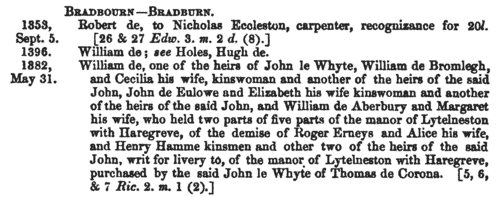
| Inhabitants of Cheshire and North Wales
(1330-1339)
The county of Cheshire had palatine status, being in some measure independent of the rest of England: moreover, from the Statute of Wales of 1284, after king Edward I's subjugation of North Wales, until the union of England and Wales in 1536 to 1543, much of the administration of North Wales (county Flint in particular) was directed from Chester. When the Chester Recognizance Rolls were moved from Chester to the Public Record Office, they were placed among the Welsh Records. These rolls, so called because they do include recognizances (of debts &c.) among their contents, are in fact the Chancery Rolls of the palatinate, containing enrolments of charters, letters patent, commissions and other documents issued under the seal of the palatinate. Deeds and other evidences of a private nature were also enrolled on them. A calendar of the Recognizance Rolls from their commencement to the end of the reign of Henry IV was prepared by Peter Turner and included in the 36th Annual Report of the Deputy Keeper of the Public Records in 1875. We have now indexed this, dividing the enrolments into decades. This is the period from the 3rd to the 13th years of king Edward III.CADOGAN. Cost: £6.00.  | Sample scan, click to enlarge
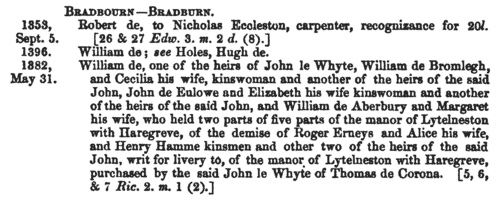
| Inhabitants of Cheshire and North Wales
(1350-1359)
The county of Cheshire had palatine status, being in some measure independent of the rest of England: moreover, from the Statute of Wales of 1284, after king Edward I's subjugation of North Wales, until the union of England and Wales in 1536 to 1543, much of the administration of North Wales (county Flint in particular) was directed from Chester. When the Chester Recognizance Rolls were moved from Chester to the Public Record Office, they were placed among the Welsh Records. These rolls, so called because they do include recognizances (of debts &c.) among their contents, are in fact the Chancery Rolls of the palatinate, containing enrolments of charters, letters patent, commissions and other documents issued under the seal of the palatinate. Deeds and other evidences of a private nature were also enrolled on them. A calendar of the Recognizance Rolls from their commencement to the end of the reign of Henry IV was prepared by Peter Turner and included in the 36th Annual Report of the Deputy Keeper of the Public Records in 1875. We have now indexed this, dividing the enrolments into decades. This is the period from the 23rd to the 33rd years of king Edward III.CADOGAN. Cost: £6.00.  | Sample scan, click to enlarge
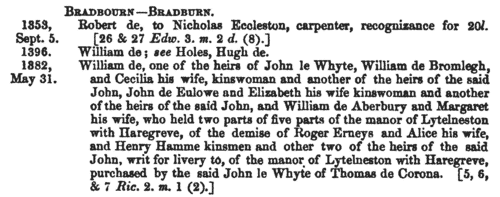
| Inhabitants of Cheshire and North Wales
(1380-1389)
The county of Cheshire had palatine status, being in some measure independent of the rest of England: moreover, from the Statute of Wales of 1284, after king Edward I's subjugation of North Wales, until the union of England and Wales in 1536 to 1543, much of the administration of North Wales (county Flint in particular) was directed from Chester. When the Chester Recognizance Rolls were moved from Chester to the Public Record Office, they were placed among the Welsh Records. These rolls, so called because they do include recognizances (of debts &c.) among their contents, are in fact the Chancery Rolls of the palatinate, containing enrolments of charters, letters patent, commissions and other documents issued under the seal of the palatinate. Deeds and other evidences of a private nature were also enrolled on them. A calendar of the Recognizance Rolls from their commencement to the end of the reign of Henry IV was prepared by Peter Turner and included in the 36th Annual Report of the Deputy Keeper of the Public Records in 1875. We have now indexed this, dividing the enrolments into decades. This is the period from the 3rd to the 13th years of king Richard II.CADOGAN. Cost: £6.00.  | Sample scan, click to enlarge
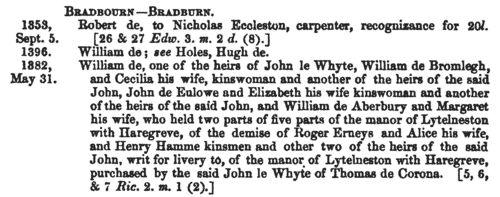
| Inhabitants of Cheshire and North Wales
(1390-1399)
The county of Cheshire had palatine status, being in some measure independent of the rest of England: moreover, from the Statute of Wales of 1284, after king Edward I's subjugation of North Wales, until the union of England and Wales in 1536 to 1543, much of the administration of North Wales (county Flint in particular) was directed from Chester. When the Chester Recognizance Rolls were moved from Chester to the Public Record Office, they were placed among the Welsh Records. These rolls, so called because they do include recognizances (of debts &c.) among their contents, are in fact the Chancery Rolls of the palatinate, containing enrolments of charters, letters patent, commissions and other documents issued under the seal of the palatinate. Deeds and other evidences of a private nature were also enrolled on them. A calendar of the Recognizance Rolls from their commencement to the end of the reign of Henry IV was prepared by Peter Turner and included in the 36th Annual Report of the Deputy Keeper of the Public Records in 1875. We have now indexed this, dividing the enrolments into decades. This is the period from the 13th year of king Richard II, who had intended to raise the earldom of Chester into a principality, to his overthrow by Henry IV.CADOGAN. Cost: £6.00.  | Sample scan, click to enlarge

| Inhabitants of Cheshire and North Wales
(1400-1409)
The county of Cheshire had palatine status, being in some measure independent of the rest of England: moreover, from the Statute of Wales of 1284, after king Edward I's subjugation of North Wales, until the union of England and Wales in 1536 to 1543, much of the administration of North Wales (county Flint in particular) was directed from Chester. When the Chester Recognizance Rolls were moved from Chester to the Public Record Office, they were placed among the Welsh Records. These rolls, so called because they do include recognizances (of debts &c.) among their contents, are in fact the Chancery Rolls of the palatinate, containing enrolments of charters, letters patent, commissions and other documents issued under the seal of the palatinate. Deeds and other evidences of a private nature were also enrolled on them. A calendar of the Recognizance Rolls from their commencement to the end of the reign of Henry IV was prepared by Peter Turner and included in the 36th Annual Report of the Deputy Keeper of the Public Records in 1875. We have now indexed this, dividing the enrolments into decades. This is the period from the 1st to the 11th years of king Henry IV.CADOGAN. Cost: £6.00.  | Sample scan, click to enlarge

| Home family archives
(1424-1671)
William Fraser of the Historical Manuscripts Commission examined the archives of the Earl of Home at Hirsel (near Coldstream in Berwickshire), and prepared this calendar, published in 1891.The most detailed account is of 'Documents, more or less of a Personal Nature relating to the Principal Members of the Family of Home' (pp. 87-107), and 'Old Charters and other Documents still in the Charter Chest at Hirsel, relating to Lands formerly possessed by the family' (107-170), with deeds relating to Auldcambus, Aldcathy, Arbirlot, Bedshiel, Bogend, Braidley, Brigham, Brighamshiels, Chirnside, Coldingham, Cowdenknowes, Crailing, Dalswinton, Derington, Dunglas, Eccles priory, Eltrive, Eskdale, Ewesdale, Fogo, Gordon, Greenlaw, Greenwood, Haddington, Harden, Hassington, Hassendean and Horsliehill, Hoscoat, Howlaws, Howpasley, Huntlywood, Jedburgh, Lambden, Lauder, Letham, Leyacres, Luchheild (in Fife), Mawdristoun (Manderston), Maw (in Fife), Mawes (in Perthshire), Mellerstain, East Nisbet, Samuelston, Smailholm, Sprouston, St Bothans (St Bathan), Swynset, Thornton, Tinneis (in Yarrow), and Upsetlington. Fraser was then allowed to inspect the family charters held by their law agent in Edinburgh in nine charter chests, and gives abstracts of the early items that he considered important. This volume also contains his calendar of some of the muniments of the Duke of Athole at Blair Castle, Blair Athole, concentrating on family correspondence from 1473 to 1721: this is also included in this index.CADOGAN. Cost: £4.00.  | Sample scan, click to enlarge

| Official Papers
(1697)
The State Papers Domestic cover all manner of business relating to Britain, Ireland and the colonies, conducted in the office of the Secretary of State as well as other miscellaneous records. Includes lists of passes to travel abroad.
CADOGAN. Cost: £4.00.  | Sample scan, click to enlarge
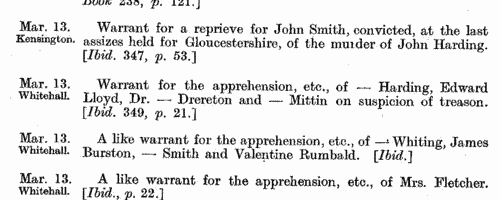
| Treasury Books
(1700-1701)
Records of the Treasury administration in Britain, America and the colonies, from October 1700 to December 1701.
CADOGAN. Cost: £4.00.  | Sample scan, click to enlarge
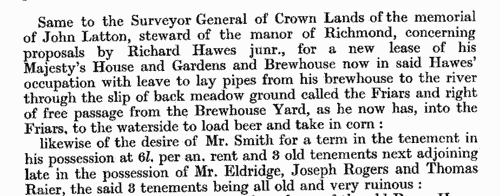
| State Papers Domestic
(1702-1703)
The State Papers Domestic cover all manner of business relating to Britain, Ireland and the colonies, conducted in the office of the Secretary of State, as well as other miscellaneous records. 1 March 1702 to 31 May 1703. The calendar was prepared by Robert Pentland Mahaffy, with certain classes of document extracted and placed in separate appendices (called Tables): I, caveats; II, church and university appointments, &c.; III, commissions, warrants for commissions, notes of commissions and notes of warrants for commissions in the English army for 1702; IV, lord lieutenants and deputy lieutenants; V, Irish warrants; VI, weekly lists of ships of the Home Fleet with their stations and orders; VII, passes, notes of passes, post warrants and licences of absence; VIII, orders on petitions; IX, Scottish warrants and commissions; and X, miscellaneous royal warrants (to the Attorney or Solicitor General; in criminal cases; diplomatic; military warrants; miscellaneous warrants; secretary's warrants, allowance of bills, &c.; and notes of warrants for the appointment of almsmen). The source material in the Public Record Office that he drew on in making this compilation is referenced throughout, and is from the State Papers Domestic (and Military, Naval, Signet Office, Various, and Letter Books and Entry Books), State Papers Scotland (Correspondence, Letter Books and Warrants), State Papers Ireland (and King's Letter Books), and State Papers Channel Islands.
CADOGAN. Cost: £4.00.  | Sample scan, click to enlarge
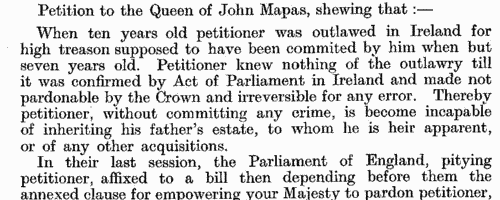
|
Research your ancestry, family history, genealogy and one-name study by direct access to original records and archives indexed by surname.
|












